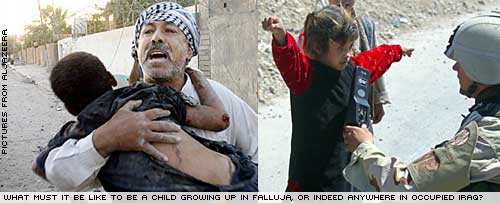As America tucked into its Thanksgiving turkey on Thursday many of the residents of Falluja in occupied Iraq began returning to what remains of their family homes. Much of the city has been reduced to rubble as US troops carried out air-raids and combed the streets raiding every building, looking for so called “Insurgents”.

Of course operations continue in the area which is still regarded by the military as a rebel stronghold, and as fighting continues the news of casualty numbers remains smudged by all sides. As a recent BBC news report explains, some Iraqis praise what they see as swift, resolute action by the US-led forces against the rebels, others are condemning the huge loss of life.
Of course, as good as I feel the BBC are at reporting the news, I sometimes feel that with military reporting restrictions, and possibly political motives playing a part, the news we see in England (and especially the news shown on American networks) may in actual fact be ‘watering down’ the true horror of this war that was initially fought under the claims that Iraq was stockpiling weapons of mass destruction.
 To that end I decided to occasionally review the coverage of this war from a Middle Eastern perspective through the regions biggest and most influential news network, Aljazeera. Their coverage is often far more gritty and graphic but not as unbalanced as I, for some reason, initially thought it would be.
To that end I decided to occasionally review the coverage of this war from a Middle Eastern perspective through the regions biggest and most influential news network, Aljazeera. Their coverage is often far more gritty and graphic but not as unbalanced as I, for some reason, initially thought it would be.
In their special report on Falluja 2004, Aljazeera publish pictures that I am quite sure would provoke outrage amongst British and American people if those same pictures were to adorn the front pages of our newspapers and news websites. That outrage would come from two entirely different directions. One from a revulsion at the horror of the result of the US-led assault, and another from the fact that people don’t want to be confronted by these terrible images vividly depicting death and destruction.
As I read about the Iraq war and see it on TV, I can’t help but think about the innocent people who are seeing their lives ruined, their homes levelled by bombs, their friends and loved ones killed and labelled as ‘collateral damage.’ Their misery is so far away from me that it is quite incomprehensible. Media coverage alone does little to make the reality of this terrible war anything other than just another news story that has little, if any, effect on my day to day life.
Then I saw a picture of an American soldier using a hand-held metal detector on a little girl as she stood at a roadside checkpoint. With her arms outstretched for the search she looks at the soldier with the eyes of an innocence that is surely being eroded by the upheaval taking place in her life. Another picture shows two young boys looking at an American soldiers machine gun. Divided by their age, and their culture, these two little boys now stand behind another dividing line made of barbed wire that lies between them and their supposed liberator.
I can’t even begin to imagine what childhood must be like for these children who must already be tragically familiar with sights most of us wish never to see for ourselves. I can only hope that some semblance of normality will return to Iraq quickly, but this war that the President of the United States declared to be over some 18 months ago, looks like it still has a long way to go. And even after the bombs have stopped exploding, and the bullets have stop flying, Iraq will most likely take many years to fully recover from the devastating effects of such a bitter conflict. Certainly for the countries children now, a ‘normal’ childhood will never be a reality. War has stolen their years of innocence, and time will never be able to give them back.
—
Aljazeera : Special report : Falluja 2004
Aljazeera : Iraq under occupation
BBC : What do Iraqis think about Falluja
BBC : US ‘alienating’ world’s Muslims
BBC : Pictures of Falluja under siege



Wrote the following comment on Nov 29, 2004 at 1:38 am
I think you’ll find that there are already WAY more US hating terrorists in that region than there ever was. For every one of the many many thousands of people killed out there by American and British forces there will be at least one new potential terrorist I would think. The point is illustrated in a pseudo game called ‘September 12th’ which you can play online. In that game you have to ret and kill the terrorists, but look what heppens to the normal people who morn the innocent people you accidently kill.
What makes me angry is that the whole weapons of mass destruction excuse has been exposed as a lie but we’re stuck with this war that somehow isn’t a war anymore according to the man who told us all that there were WMD there, a man that somehow got a second term much to the dissapointment of the watching world.
I am however thankful in a way that the US military is so badly stretched because that does at least mean we are relatively assured that the boy Bush can’t start any more wars.
Wrote the following comment on Nov 28, 2004 at 8:12 pm
I pray that this war does not spawn a new generation of U.S. hating terrorists… but I guess I wouldn’t blame them. I imagine it should be sheer terror for these children. Breaks my heart. Thank you for this post